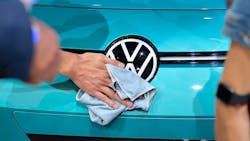VW Expanding Chattanooga Factory to Build, Design Electric Vehicles
On August 12, Volkswagen of America announced it would expand its Chattanooga, Tennessee factory into a North American electric vehicle assembly and R&D center.
The German automaker plans to add a high-voltage laboratory to the facility to develop and test power sources for electrical vehicles to be assembled in the United States. The batteries themselves will be built by VW partner SKI in Georgia.
Volkswagen says the lab should be operational by spring 2021 and will feature specialized equipment for testing how batteries perform under adverse conditions, including climate chambers, pressure testers, and a “custom multi-axis shaker table,” or MAST, to test how batteries handle intense vibration. The MAST destined for use in the Chattanooga factory must be custom-built, said Volkswagen, because few MASTs are designed for use with electrical batteries, often the heaviest component of the electric vehicle.
It was important for Volkswagen to do its own battery testing, said Wolfgang Maluche, VP of engineering at Volkswagen of America. “There are two ways that auto companies approach the development of electric vehicle batteries,” he said in a statement. “A lot of them will farm out the development and testing of batteries to another company, and some will actually do the work of developing and testing in-house. We are doing the latter.”
As a part of Volkswagen’s stated goal to achieve carbon neutrality by 2050, the lab is currently being planned to adhere to LEED environmental standards: “This lab was planned to be as sustainable as possible,” said Maluche.
Volkswagen currently has three electric vehicles in various stages of development: the ID.3, ID.4, and ID Buzz. Since Volkswagen does not have plans to sell the ID.3 in the United States, the Chattanooga plant is more likely to be a testing site for the ID.4 and Buzz. The ID.4 is a compact vehicle, similar to the ID.3, while the ID Buzz is an updated electric version of Volkswagen’s van.
About the Author
IW Staff
Find contact information for the IndustryWeek staff: Contact IndustryWeek
